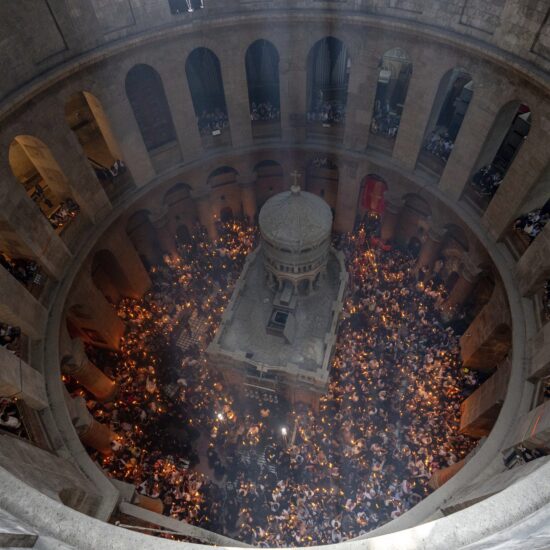WASHINGTON (ABP) – Former and possible future presidential candidate Mike Huckabee went on Comedy Central’s Daily Show to defend his praise for David Barton, a leading advocate for the view that America was founded as a Christian nation using what critics call revisionist history.
Speaking after Barton at the recent “Rediscover God in America” conference in Iowa, Huckabee said he doesn’t know of a more effective communicator than the founder and president of WallBuilders, a pro-family organization that promotes “America’s forgotten history and heroes,” with particular attention to “the moral, religious and constitutional foundation on which America was built.”
“I just wish that every single young person in America would be able to be under his tutelage and understand something about who we really are as a nation,” said Huckabee, a Fox News personality who is leading polls among possible GOP presidential contenders in 2012.
“I almost wish there would be like a simultaneous telecast, and all Americans would be forced — forced at gunpoint no less — to listen to every David Barton message,” Huckabee joked. “And I think our country would be better for it.”
Pressed April 6 on his admiration for Barton by Daily Show host Jon Stewart, Huckabee said he thinks Barton “is very much a historian” whose objective is “to bring some balance to the idea that the founders had no spiritual direction at all.”
During the interview the former Arkansas governor and ordained Baptist minister gave his own views on the phrase “separation of church and state.”
“Separation of church and state was a phrase that didn’t appear until a letter Thomas Jefferson wrote in 1804,” he said. “It was written to the Danbury Baptist Association in Connecticut, and it was the polar opposite of how many people have interpreted it.”
“They have interpreted it to say that it was essentially a doctrine that the church wasn’t to involve itself in the affairs of state,” Huckabee said. “Actually it was the opposite. It was that the government would not pick out a particular church and establish it as a state church.”
Brent Walker of the Baptist Joint Committee for Religious Liberty said Huckabee was partly right about the letter, which actually was written in 1802, in that Jefferson applied his “wall of separation”to the federal government and not individuals, but wrong in saying that was the first time the metaphor appeared
Walker said Roger Williams, founder of the first Baptist church established on American soil and a religious-liberty advocate in colonial America, used it 150 years earlier when he referred to “a hedge or wall of separation between the garden of the church and the wilderness of the world.”
“Williams and Jefferson understood the benefits to both the church and state of keeping those two entities separate and distinct,” Walker said.
Walker also disputed Huckabee’s assertion that Jefferson’s letter was the “polar opposite” of what church-state separationists believe today. The letter was the president’s response to an earlier letter from the Danbury Baptists complaining that their religious privileges under Connecticut’s established church were enjoyed “as favors granted, and not as inalienable rights.” The Baptists described themselves as “uniformly on the side of religious liberty and that “no man ought to suffer in name, person or effects on account of his religious opinions.”
In an unedited version of the interview on the Daily Show website, Huckabee, a former pastor and past president of the Arkansas Baptist State Convention, also explained what Barton meant by his quoted comment “Jesus did not like the minimum wage.”
“I know what he’s basing it on because I’ve heard him talk about it,” Huckabee said. “The parable that Jesus told about the three workers — one that went in the middle of the day, one that went earlier in the day and one that went late in the day — and at the end of the day they all got the same wages.”
“And one was saying, ‘Wait a minute I worked all day,’ and the master said, ‘It is not for you to decide what I pay, because you agreed to the wage for the whole day and the other one agreed for the wage for half the day and the other agreed to a wage that was only for a small part of the day.”
“I think what David was saying is there is not a hard and fast policy, but there is in principle, which is if you agree to work for someone for a wage, then what someone else gets paid is really not the issue,” Huckabee said. “It is did you agree to work for that wage?”
“If you did, then you agree to work for it,” he continued. “I mean, there are people who get paid a lot more money than I do, and some don’t get paid as much.”
-30-
Bob Allen is senior writer for Associated Baptist Press. mailto:bob@abpnews.com

